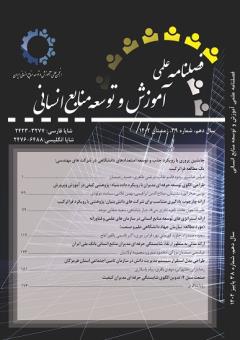ارائه مدلی به منظور ارتقاء شایستگی حرفهای مدیران منابع انسانی بانک ملی ایران
محورهای موضوعی : روش های نوین آموزش وتوسعه منابع انسانیعباسعلی صمدیان برزکی 1 , محمود صفری 2 , معصومه اولادیان 3
1 - دانشجوی دکتری رشته مدیریت آموزشی، دانشگاه آزاد اسلامی، واحد دماوند، دماوند، ایران.
2 - استادیار، دانشگاه آزاد اسلامی، واحد دماوند (تهران)، گروه علوم تربیتی تهران، ایران
3 - استادیار، دانشگاه آزاد اسلامی، واحد دماوند (تهران)، گروه علوم تربیتی تهران، ایران
کلید واژه: صلاحیت, شایستگی حرفهای, مدیران منابع انسانی , بانک ملی,
چکیده مقاله :
پژوهش حاضر طراحي مدلی منظور ارتقاء صلاحیت حرفهای مدیران منابع انسانی بانک ملی ایران است. روش این تحقیق از نظ ر هدف کاربردی است و به روش آمیخته- اکتشافی (کیفی- کمی) انجام شده است. جامعه آماری در بخش کیفی شامل مدیران ارشد منابع انسانی و خبرگان دانشگاهی صلاحیت حرفهای بود. گردآوری دادهها طی مصاحبههای نیمه ساختاریافته با 15 نفر از اعضای جامعه آماری صورت گرفت که با روش نمونهگیری هدفمند انتخاب شده بودند، صورت گرفت. دادههای تحقیق بر اساس فرآیند تحلیل کیفی طی کدگذاری سه گانه باز، محوری و انتخابی از طریق نرم افزار مکسکیودا 2020 مورد تجزیه و تحلیل قرار گرفتند. جامعه آماری در بخش کمی شامل مدیران، کارکنان و کارشناسان بخش منابع انسانی بانک ملی ایران بودند. گردآوری دادهها طی پرسشنامه محقق ساخته از بین 291 نفر از اعضای جامعه آماری صورت گرفت که با روش نمونهگیری تصادفی انتخاب شده بودند، صورت گرفت. تجزیه و تحلیل دادههای جمعآوری شده، به دو روش توصیفی و استنباطی از طریق نرم افزار SPSS 16 و Smart PLS انجام شد. بر اساس نتایج تحلیل کیفی مدل ارتقاء صلاحیت حرفهای مدیران منابع انسانی دارای دو بعد سطح کلان (زمینه بانکی) شامل مولفههای زیرساختهای سازمانی، سیستم مدیریت دانش، برنامههای توسعهای در بانک، مشارکت ذینفعان در طراحی صلاحیتهای حرفهای، نگرش سازمانی در بانک، استراتژیهای آموزشی بانکی و سطح خرد (مدیران منابع انسانی در بانک ملی ایران) شامل مولفههای عوامل شخصیتی مدیران، مهارتهای رهبری مدیران، دانش فناورانه مدیران، مهارتهای آموزشی- پژوهشی بود. اولویت و عوامل شخصیتی مدیران (با بار عاملی 0.775) دارای کمترین اولویت بودند
The current research is designing a model to improve the professional qualification of human resources managers of the National Bank of Iran. The method of this research is practical in terms of purpose and it was done by mixed-exploratory (qualitative-quantitative) method. The statistical population in the qualitative section included senior managers of human resources and professional academic experts. Data collection was done through semi-structured interviews with 15 people from the statistical population who were selected by purposive sampling. The research data were analyzed based on the qualitative analysis process during open, central and selective triple coding through MaxQuda 2020 software. The statistical population in the quantitative part includes the managers, employees and experts of the Human Resources Unit of the National Bank of Iran. Data collection was done through a researcher-made questionnaire from among 291 members of the statistical population who were selected by random sampling. The analysis of the collected data was done in two descriptive and inferential ways through SPSS 16 and Smart PLS software.so results of the qualitative analysis of the professional qualification improvement model of human resource managers with two macro-level dimensions (banking field) including organizational infrastructure components, knowledge management system, development programs in the bank, stakeholders' participation in the design of professional qualifications, organizational attitude in the bank, banking educational strategies It included the components of managers' personality factors, managers' leadership skills, managers' technological knowledge, educational-research skills. Priority and personality factors of managers (with a factor load of 0.775) had the lowest priorityand the micro level)
ابراهیمزاده، بیتاله، ناظم، فتاح. (1397). شناسایی و تدوین مولفههای موثر بر مدل شایستگی مدیران مدارس ابتدایی شهر تهران. فصلنامه رهبری و مدیریت آموزشی. 12 (4). 23-9.
آسترکی، سمانه، مهرداد، حسین، قبادیان، مسلم. (1401). شناسایی مولفه های مدل شایستگی های حرفه ای مدیران آموزشی (مورد مطالعه: دوره متوسطه دوم استان لرستان). فصلنامه رهبری و مدیریت آموزشی. 16 (2). 134-109.
جعفریراد علی، زاهد بابلان عادل، مرادی مسعود، ثمری عیسی.(1398). الگوی مفهومی توسعه شایستگی مدیران مدارس متوسطه، نظریه ای داده بنیاد. مطالعات توسعه اجتماعي –فرهنگي. ۷ (۴) :۱۶۳-۱۸۸.
Amirov, A., Baimuldin, M., & Shakirova, J. (2014). Automation working place head of department. Procedia-Social and Behavioral Sciences, 131, 193-197.
Antonova O., Maslak L. (2020) The European dimension of the competence approach and its conceptual principles. Professional pedagogical education: competence approach monograph. Publishing house of ZhSU named after I. Franko. pp.81-109.
Bairašauskienė, L. (2017). Headmaster’s competencies in management area: evaluating the significance level of managerial competencies in Lithuanian comprehensive schools. European Journal of Multidisciplinary Studies, 2(5), 230-236.
Daryaband, T., Oladian, M., & Hosseini, S. R. (2020). Designing a Model of Professional Competence of Managers Based on the Development of Creativity and Innovation in Primary Schools. Iranian journal of educational sociology, 3(4), 190-198.
Dudin, M. N., Vysotskaya, N. V., Frolova, Е. Е., Pukhart, A. A., & Galkina, M. V. (2017). Improving professional competence of the staff as a strategic factor for sustainable development of companies. Journal of Business and Retail Management Research, 12(1).
Erkaboeva, N. S., & Bakhromovna, M. M. (2022). A MODERN APPROACH TO THE FORMATION OF PROFESSIONAL COMPETENCE IN FUTURE DEFECTOLOGISTS. Galaxy International Interdisciplinary Research Journal, 10(12), 1723-1725.
Fachrurrazi (2017). Relationship Between Teacher Perofessional Competences & Teacher Work – Autonomy, Jurnal Pendidikan,Volum 1 Issue 2, 281 – 300,https://jurnalsukma.org.
Few, W.T. (2017). Managerial Competitor Identity Perspectives, Interacting the Categorization, Economic and Organizational Identity Perspectives, Un Published Doctoral Dissertation, university Of Pittsburgh Gay, L.R., Mills, G.E., and Airasian, P.W. (2008). Educational research: Competencies for analysis and Hameed, S., & Sharma, V. (2020). A study on leadership competencies of the generation Z in a VUCA world. Int. J. Adv. Sci. Technol, 29(9), 2379-2393.
Kryshtanovych, S., Bilyk, O., Shayner, H., Barabash, O., & Bondarenko, V. (2021). Study of the Experience of the Formation of Professional Competence in Future Managers of Physical Education and Sports. Revista Romaneasca Pentru Educatie Multidimensionala, 13(1Sup1), 162-176.


